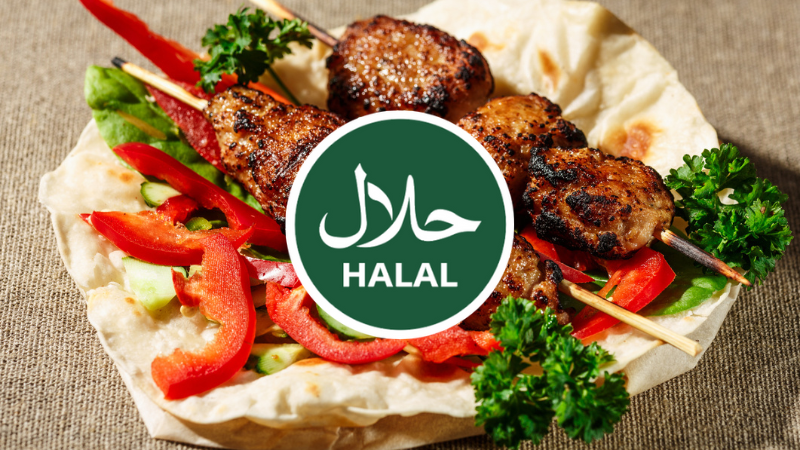
CHICAGO, October 24, 2025 — The Arabic word “halal” translates into English as “permissible.” A more appropriate definition for the food-away-from-home industry may well be “surging opportunity.”
Operators from all channels of the U.S. foodservice business say the demand for foods processed in accordance with the Islamic faith has been growing at a head-turning clip. College-and-university feeders in particular say they’d be hard-pressed to name a cuisine being more eagerly embraced.
The online research house ResearchAndMarkets.com projected this summer that sales of halal foods will grow at a compound annual rate of 9.5% for at least the next eight years, or from $110 billion in 2024 to $226 billion by 2034.
The main drivers, according to the research company, are rapid growth of the United States’ Muslim population and a perception among non-Muslims that foods labeled as halal have been produced more responsibly. To earn the designation, an item has to meet strict requirements set out in Islamic law. Meats, for instance, can only come from animals that were slaughtered in a humane fashion.
Yet awareness remains less than universal, with comprehension often correlating with the size of the Muslim population served by a food-away-from-home facility.
By that criterion, unawareness is likely to be short-lived; estimates of the United States’ current Muslim population range from 3 million to 4.5 million, with both immigration, domestic births, and conversions to Islam rapidly swelling the count.
Sliced another way, Islam is the nation’s second-fastest-growing religion, behind Christianity, and is poised to surpass Judaism as the second most prevalent faith.
What is halal, and what makes it different?
For the sake of FAFH professionals who may not be familiar with halal foods, here’s a primer.
What foods can legitimately be called halal?
The criteria have been set by the Quran, the holy book upon which Islam is largely based, and the Hadith, the collected sayings of the Prophet Mohammed. Muslims profess that the strict dietary rules are how Allah, or God, expect his true followers to eat.
Chief among those rules: Pork and any products made from pigs are strictly forbidden, or “haram” in Arabic. Alcohol and any other sort of intoxicants are similarly forbidden. The latter tenet applies even to personal-care products that could be used on an observer’s skin.
Strict rules also govern what meat an observant Muslim can eat. The protein can only be consumed if it comes from an animal that is slaughtered humanely, ideally by having its throat cut quickly with a sharp knife to minimize suffering.
The butcher must be an adult Muslim adjudged to be of sound mind and good standing in Allah’s eyes. He is required to pay tribute to Allah during the slaughter by saying aloud in Arabic, ““In the name of Allah, Allah is the greatest.”
The animal must be in sound health before being killed, and the setting has to meet strict sanitation standards.
Carnivorous mammals are forbidden to be eaten, as are snakes.
Meat or any other halal food cannot be contaminated through contact with non-halal fare. That often means setting up separate processing facilities to prevent cross-contamination.
Halal products should also be stored apart from non-halal products, and ideally only handled by Muslims. For those reasons, arranging distribution can be a challenge.
Is halal more expensive?
Because of the manual slaughtering process, halal meat can be pricier. Demand for volume has prompted some purveyors to use automated slaughtering techniques, but that method remains controversial. Devout followers regard it as haram.
Because even vegetables need to be verified and certified as being halal, they can also carry a higher price.
Is halal the same as kosher?
Although the two sets of dietary rules share many commonalities, they are not the same.
Both diets call for avoiding pork, for instance, and the slaughtering has to be done under the supervision of an approved authority. But that figure has to be a rabbi for the meat to be certified as kosher, not just a person of the faith. In addition, the rabbi need not say anything as the animal is being killed.
Alcohol also figures into some Judaic celebrations, like Passover.
In any case, the two types of fare cannot be regarded as. Interchangeable.
Is halal still a cuisine on the margins of the mainstream?
No, declares the Halal Food Council USA, a domestic organization that offers certification of halal foods and works to expand its availability throughout the country.
It noted in a report posted online last year that non-Muslims are attracted to the fare because of attributes that have nothing to do with religion.
“Many non-Muslim consumers are becoming more health-conscious and are drawn to halal food due to its strict guidelines regarding cleanliness, humane animal treatment, and overall quality,” the Council stated. “For many, the halal certification represents a higher level of food safety and ethical standards.”
It added that awareness and availability have greatly expanded because of the internet and the ability to purchase halal from a website and have it shipped. As a result, "fast-food chains and global franchises are beginning to offer halal-certified options to cater to a broader audience,” the group noted.
One of the restaurant industry’s fastest-growing chains in recent years has been The Halal Guys, a concept that specializes in halal platters. From a cart in New York City, the brand has grown to more than 100 branches in 19 states.
Where can I try halal food?
A website called Zabihah claims to be the world’s largest online directory of restaurants featuring halal fare. A sharp-eyed visitor will note that availability is still greatest along the coasts, but that is rapidly changing.
As Managing Editor for IFMA The Food Away from Home Association, Romeo is responsible for generating the group's news and feature content. He brings more than 40 years of experience in covering restaurants to the position.